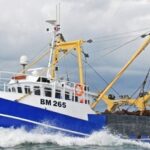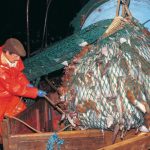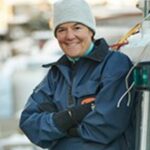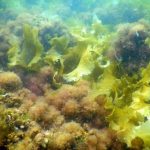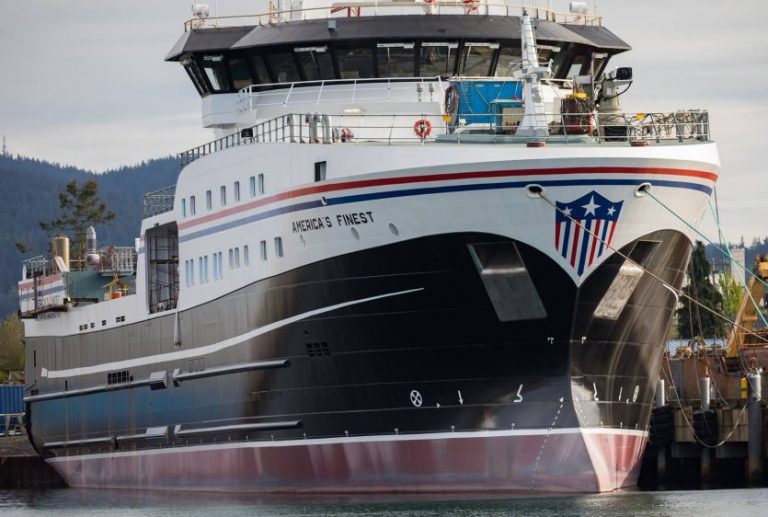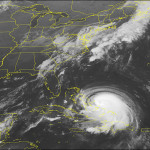Monthly Archives: October 2016
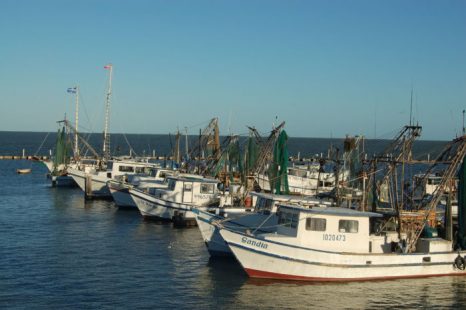
The Quiet Fishing Town Near Austin That Seems Frozen In Time
Most Americans are very disconnected from the source of the food they eat. In Austin, we enjoy beef from cattle ranches and seafood from commercial fishermen that we never come into contact with. Fulton, Texas is a little fishing village about 188 miles directly south of Austin. Visitors to this pretty place can see fishing firsthand, and even do a little of their own. View this nice little photo article here 09:17
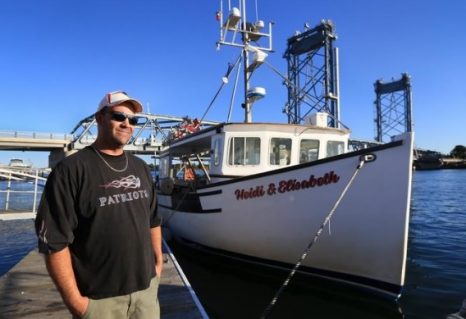
Last of the fishermen: NH’s ground fishing captains fading away
Dozens of commercial fishing boats were once docked along the New Hampshire coastline and trawled through the Gulf of Maine to drag in thousands of pounds of cod. Today, only about five commercial ground fishermen remain active in New Hampshire. And as they continue to struggle with strict regulations on cod and other species of groundfish, many question the future of groundfishing in the Granite State. One active ground fisherman, Neil Pike, said “there ain’t one.” He lives in Seabrook and fishes out of Hampton Harbor where he said there used to be 13 other fishing vessels docked next to his. Now, he said there are three and he owns two of them. NOAA’s Greater Atlantic Regional Administrator John Bullard said strict quotas are necessary to bring cod stocks back and give the fish a better chance of making a comeback. Central to many of the fishermen’s frustrations is their belief that NOAA’s stock assessments are incorrect. New Hampshire fishermen have said NOAA stock assessments do not line up with the amount of cod they see on the water each day. Some captains claim NOAA is out to squash small boat fishermen to make it easier for them to manage federal waters. Read the story here 08:26
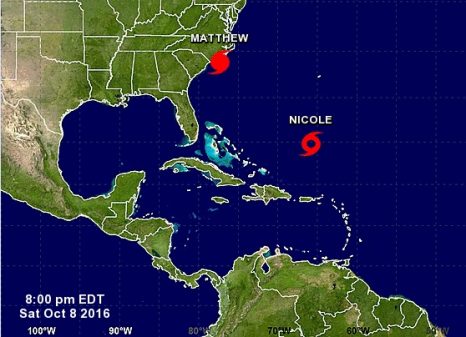
Oct 8, 20:00 Hurricane Matthew – Center now east of Cape Fear, record breaking flooding developing over eastern N.C.
At 800 PM EDT (0000 UTC), the center of Hurricane Matthew waslocated near latitude 33.8 North, longitude 77.3 West. Matthew is moving toward the east-northeast near 13 mph (20 km/h), and this motion is expected to continue tonight and early Sunday. On the forecast track, the center of Matthew will be near the coast of southern North Carolina by this evening. Maximum sustained winds remain near 75 mph (120 km/h) with higher gusts. While Matthew is expected to remain near hurricane strength while the center is near the North Carolina coast, the system could become a post-tropical cyclone later tonight or on Sunday. STORM SURGE: The combination of a dangerous storm surge, the tide, and large and destructive waves will cause normally dry areas near the coast to be flooded by rising waters moving inland from the shoreline. The water could reach the following heights above ground if the peak surge occurs at the time of high tide… Murrells Inlet, South Carolina, to Duck, North Carolina, including portions of the Pamlico and Albemarle Sounds…3 to 5 ft Read the update here 20:18
Not Your Average Fish: Tuna Shares ‘Super Predator’ Genes With Great White Sharks
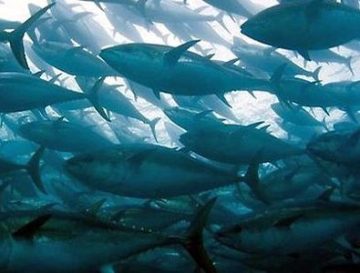 Despite independent evolution for 400 million years, sharks and tunas still share common genetic traits. They include higher metabolism, body temperature and fast swimming skills. In the lamnid group of sharks, great white sharks are a major presence. Some common genetics make them super predators with brisk swimming power and the ability to stay warm. This was revealed in a new research by Imperial College London which asserted the commonality of genes in the two groups as key to their predatory edge. Regarding the identical genes in both the groups, the team said they are mainly linked with metabolism and the ability to produce energy. The study, published in Genome Biology and Evolution Journal, had Professor Vincent Savolainen from the Department of Life Sciences at Imperial as the Co-author. “Lamnid sharks and tuna both have stiff bodies and tails that allow them to swim in bursts. They can also keep their temperature up in colder waters. Both of these things make them more effective predators, allowing them to snatch prey in usually inhospitable waters,” Savolainen said. Read the rest here 16:41
Despite independent evolution for 400 million years, sharks and tunas still share common genetic traits. They include higher metabolism, body temperature and fast swimming skills. In the lamnid group of sharks, great white sharks are a major presence. Some common genetics make them super predators with brisk swimming power and the ability to stay warm. This was revealed in a new research by Imperial College London which asserted the commonality of genes in the two groups as key to their predatory edge. Regarding the identical genes in both the groups, the team said they are mainly linked with metabolism and the ability to produce energy. The study, published in Genome Biology and Evolution Journal, had Professor Vincent Savolainen from the Department of Life Sciences at Imperial as the Co-author. “Lamnid sharks and tuna both have stiff bodies and tails that allow them to swim in bursts. They can also keep their temperature up in colder waters. Both of these things make them more effective predators, allowing them to snatch prey in usually inhospitable waters,” Savolainen said. Read the rest here 16:41
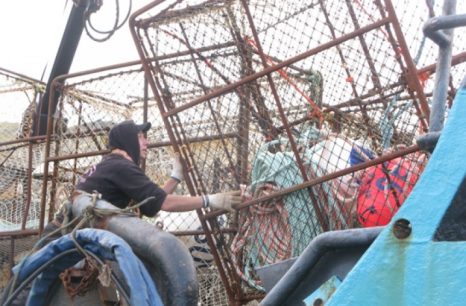
Coming season cuts and cancellations are causing anxiety for Alaska crabbers
“I’m scared,” said Simeon Swetzof, mayor of St. Paul, a central Bering Sea island with considerable crab dependence. “I don’t know what’s going to happen.” The Alaska Department of Fish and Game closed the 2016-17 Bairdi or tanner crab season on Oct. 5, following a 15 percent cut in the harvest quota for Bristol Bay red king crab and a 50 percent cut in the snow crab fishery. Without intervention from the Alaska Board of Fisheries, requested by tanner crab stakeholders, the millions of pounds and millions of dollars of Bairdi will remain in the sea. Last year, the fishery’s total ex-vessel value was $45.3 million. Crab stocks are managed jointly between the Alaska Department of Fish and Game and the North Pacific Fishery Management Council. The North Pacific council, one of eight councils that manage fisheries from three to 200 miles off the coast, sets the overfishing limits and annual catch limit for crab. ADFG then sets the total allowable catch, or TAC. Tanner crab was one of two stocks the National Oceanic and Atmospheric Administration charted as having a declined biomass. In 2015, the biomass prediction for tanner crab was 163 million pounds. This year, surveys chart a drop down to a biomass of 100 million pounds. Read the story here 12:02
NOAA Launches Observer Safety Program Review
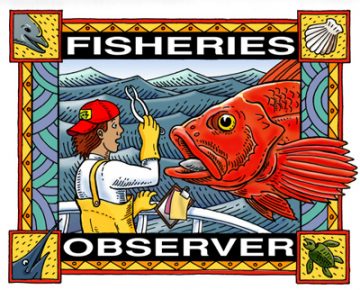 NOAA is now conducting an Observer Safety Program Review as part of our ongoing efforts to assess and evaluate procedures for keeping U.S. fisheries observers and at-sea monitors safe. The health and safety of our observers and at-sea monitors is a top priority for the agency. The review will focus on seven areas related to safety and health, including: safety reporting, communications, practices and policies, training, regulations, equipment, and international observer programs. An outside contractor will conduct the safety review on behalf of the agency. The work is intense, and conditions can be uncomfortable. Observers may spend days, weeks, or months aboard commercial fishing and receiving vessels. Long trips, close quarters, and their role in monitoring compliance can sometimes lead to tensions onboard. Preparing observers for safe deployments requires an active partnership between NOAA Fisheries (including our Office of Law Enforcement and General Counsel), observers, observer providers, the U.S. Coast Guard, and the fishing industry. Read about it here 10:51
NOAA is now conducting an Observer Safety Program Review as part of our ongoing efforts to assess and evaluate procedures for keeping U.S. fisheries observers and at-sea monitors safe. The health and safety of our observers and at-sea monitors is a top priority for the agency. The review will focus on seven areas related to safety and health, including: safety reporting, communications, practices and policies, training, regulations, equipment, and international observer programs. An outside contractor will conduct the safety review on behalf of the agency. The work is intense, and conditions can be uncomfortable. Observers may spend days, weeks, or months aboard commercial fishing and receiving vessels. Long trips, close quarters, and their role in monitoring compliance can sometimes lead to tensions onboard. Preparing observers for safe deployments requires an active partnership between NOAA Fisheries (including our Office of Law Enforcement and General Counsel), observers, observer providers, the U.S. Coast Guard, and the fishing industry. Read about it here 10:51
Are these Gulf shrimp? Audubon program aims to hook you on local seafood
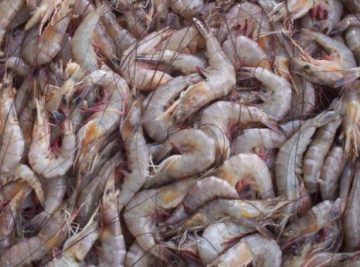 “National Seafood Month is very much about educating people about Gulf of Mexico seafood and why it’s important to support Gulf of Mexico seafood,” said John Fallon, assistant director of the GULF program. In New Orleans, the month will be marked with a six-course Tuna Fête on Oct. 25 at Carrollton Market restaurant. The dinner will star Gulf of Mexico yellowfin tuna. Dinner with wine pairings is $150 per person, $100 without wine. Tax and gratuity included. It’s a good time for locals to get in the habit of finding out where the seafood they are eating comes from, he said, noting, “90 percent of seafood consumed in the United States is imported” from other countries. Video, Read the rest here 10:38
“National Seafood Month is very much about educating people about Gulf of Mexico seafood and why it’s important to support Gulf of Mexico seafood,” said John Fallon, assistant director of the GULF program. In New Orleans, the month will be marked with a six-course Tuna Fête on Oct. 25 at Carrollton Market restaurant. The dinner will star Gulf of Mexico yellowfin tuna. Dinner with wine pairings is $150 per person, $100 without wine. Tax and gratuity included. It’s a good time for locals to get in the habit of finding out where the seafood they are eating comes from, he said, noting, “90 percent of seafood consumed in the United States is imported” from other countries. Video, Read the rest here 10:38
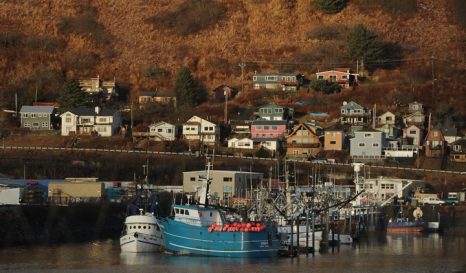
Fishy politics lures candidates of every stripe to Kodiak
The lure of reaching a statewide radio audience once again is attracting a full slate of political hopefuls to Kodiak for its popular fisheries debate. On Wednesday, five candidates for U.S. Senate will travel to the nation’s No. 2 fishing port to share their ideas on Alaska’s seafood industry. “It’s a great service to Kodiak, to our fishing communities and to Alaska in general,” said Trevor Brown, director of the Kodiak Chamber of Commerce, host of the event. “Fishing is the state’s largest private-sector employer. I think the candidates realize the importance of the fishing industry.” Since 1990, the Kodiak debates have been an election year staple for candidates running for governor and Congress, and they’ve gotten 100 percent participation. Read the story here 09:41
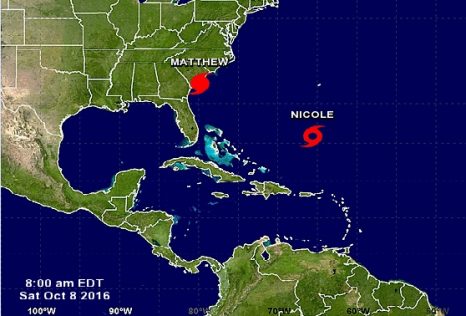
Oct 8, 0800 Hurricane Matthew – strong winds and dangerous storm serge affecting coast of South Carolina
At 800 AM EDT (1200 UTC), the center of Hurricane Matthew was located by NOAA Doppler weather radars, and an Air Force Reserve Hurricane Hunter aircraft, near latitude 32.5 North, longitude 79.8 West. Matthew is moving toward the northeast near 12 mph (19 km/h), and this general motion is expected to continue today. On the forecast track, the center of Matthew will continue to move near or over the coast of South Carolina today, and be near the coast of southern North Carolina by tonight. Reports from the reconnaissance aircraft indicate that maximum
sustained winds have decreased to near 85 mph (140 km/h) with higher gusts. Although weakening is forecast during the next 48 hours, Matthew is expected to remain a hurricane while the center is near the coasts of South Carolina and North Carolina. Read the update here 08:33
What Hunters and Anglers Should Know Before They Vote
 Americans who enjoy fishing, hunting, and other wilderness sports should be aware of a number of important issues before stepping into the voting booth in November. Despite objections from many prominent Hawaiians and a federal regional fishing council, President Barack Obama recently quadrupled the size of the Papahanaumokuakea Marine National Monument (PMNM), first created by President George W. Bush in 2006. Obama used his executive authority under the Antiquities Act of 1906 to extend the marine reserve’s boundaries, banning fishing and mining in the 200-mile exclusive economic zone surrounding the reserve, which covers much of the northwestern islands of Hawaii and their surrounding waters. Obama’s actions were motivated by a desire to attain as much authority as possible for the federal government and to enhance the power and influence of his radical environmental constituency before leaving office. One of the candidates in the 2016 race, Hillary Clinton, has promised to double down on Obama’s environmental policies. Americans concerned about property rights, hunting, fishing, and states’ rights should make their voices heard about these failed policies. Read the opinion piece here 07:59
Americans who enjoy fishing, hunting, and other wilderness sports should be aware of a number of important issues before stepping into the voting booth in November. Despite objections from many prominent Hawaiians and a federal regional fishing council, President Barack Obama recently quadrupled the size of the Papahanaumokuakea Marine National Monument (PMNM), first created by President George W. Bush in 2006. Obama used his executive authority under the Antiquities Act of 1906 to extend the marine reserve’s boundaries, banning fishing and mining in the 200-mile exclusive economic zone surrounding the reserve, which covers much of the northwestern islands of Hawaii and their surrounding waters. Obama’s actions were motivated by a desire to attain as much authority as possible for the federal government and to enhance the power and influence of his radical environmental constituency before leaving office. One of the candidates in the 2016 race, Hillary Clinton, has promised to double down on Obama’s environmental policies. Americans concerned about property rights, hunting, fishing, and states’ rights should make their voices heard about these failed policies. Read the opinion piece here 07:59
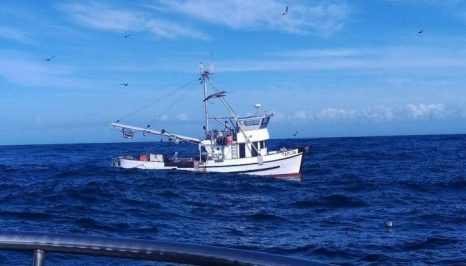
Coast Guard rescues 5 fishermen from sinking vessel near Grays Harbor, Wash.
The Coast Guard rescued five fishermen from the 56-foot commercial fishing vessel Taplow which began taking on water 19 miles south west of Grays Harbor, Friday. The men safely boarded a Coast Guard Station Grays Harbor 52-foot motor life boat and were transported by the crew to Grays Harbor. Coast Guard Sector Columbia River watchstanders received the distress call from the captain of the Taplow stating that they were taking on water, their engine room was half flooded and their pumps had stopped working. The watchstanders directed the crew to activate their Electronic Position Indicating Radio Beacon and don immersion suits. An Urgent Marine Information Broadcast was issued and the MLB as well as a MH-60 Jayhawk helicopter crew from Sector Columbia River were directed to launch. An additional Sector Columbia River helicopter crew, who had landed at Grays Harbor for a personnel transfer, also responded to the vessel in distress. The helicopter crew that was at Grays Harbor was the first to arrive on scene with the Taplow, delivered a pump and remained on scene until they were relieved by the second helicopter crew. A rescue swimmer was then deployed to assist with the dewatering efforts and await the arrival of the Grays Harbor MLB crew. Link 23:06
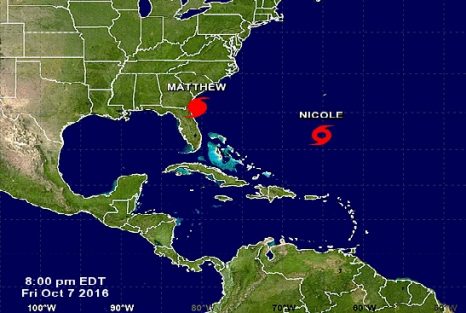
Oct 7, 20:00 EYE OF HURRICANE MATTHEW MOVING NORTHWARD OFF THE COASTS OF GEORGIA AND NORTHEASTERN FLORIDA
At 800 PM EDT (0000 UTC), the eye of Hurricane Matthew was located near latitude 30.7 North, longitude 80.6 West. Matthew is moving toward the north near 12 mph (19 km/h), and this motion is expected to continue tonight. A turn toward toward the north-northeast and then to the northeast is expected on Saturday. On the forecast track, the center of Matthew will continue to move near or over the coast of northeast Florida and Georgia through tonight, and near or over the coast of South Carolina on Saturday. Maximum sustained winds are near 110 mph (175 km/h) with higher gusts. Although weakening is forecast during the next 48 hours, Matthew is expected to remain a hurricane until it begins to move away from the southeastern United States on Sunday. Read the update here 20:23
Marystown an obvious choice for Norwegian-style salmon farm, contractor says
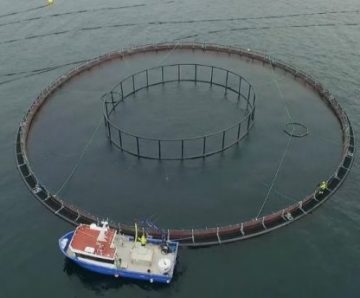 The company contracted to build a controversial aquaculture hatchery in Marystown says Newfoundland is the perfect place to bring its Norweigian technology — not only are weather conditions similar, but it’s closer to American buyers. “I think Grieg [Seafarms] is looking at the horizon,” said Yoav Dagan, vice president of Aqua Moaf Group. “It’s going to extend their shelf life. They will not have to take the fish from Norway to Poland and then to go back to process. They’re going to process it on site here in Canada and to track it right away to the U.S. market.” According to a news release issued Tuesday, construction on the hatchery and nursery facility will begin in 2017 and will use recirculating aquaculture system [RAS] technology. (How do they do that with the sea cages?) The company said it will use 11 sea cages to grow and harvest 33,000 annual tonnes of Atlantic salmon. According to Aqua Moaf, it will be the largest and most advanced salmon harvesting facility in the world. “It’s everything that the client wants, it’s antibiotic free and environmentally [friendly] so this is where we are going,” Dagan told CBC Radio’s The Broadcast. “If you come to our farms you will see that we are zero discharge, so basically we do not release anything into the environment. Everything is recycled. We treat the waste so basically the waste that is going out is coming out as a solid.” (something ain’t stackin’ up here.) Video, Read the story here. 17:50
The company contracted to build a controversial aquaculture hatchery in Marystown says Newfoundland is the perfect place to bring its Norweigian technology — not only are weather conditions similar, but it’s closer to American buyers. “I think Grieg [Seafarms] is looking at the horizon,” said Yoav Dagan, vice president of Aqua Moaf Group. “It’s going to extend their shelf life. They will not have to take the fish from Norway to Poland and then to go back to process. They’re going to process it on site here in Canada and to track it right away to the U.S. market.” According to a news release issued Tuesday, construction on the hatchery and nursery facility will begin in 2017 and will use recirculating aquaculture system [RAS] technology. (How do they do that with the sea cages?) The company said it will use 11 sea cages to grow and harvest 33,000 annual tonnes of Atlantic salmon. According to Aqua Moaf, it will be the largest and most advanced salmon harvesting facility in the world. “It’s everything that the client wants, it’s antibiotic free and environmentally [friendly] so this is where we are going,” Dagan told CBC Radio’s The Broadcast. “If you come to our farms you will see that we are zero discharge, so basically we do not release anything into the environment. Everything is recycled. We treat the waste so basically the waste that is going out is coming out as a solid.” (something ain’t stackin’ up here.) Video, Read the story here. 17:50
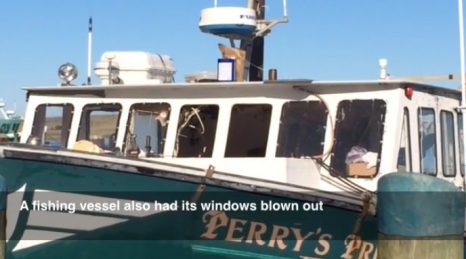
Tough day at the Chatham Break: a capsized boat, and the windows blown out of another
David Wiener and his son Hans were returning to Pleasant Bay Thursday through the infamous Chatham break, a maze of water crashing over shoaling sandbars, when they found themselves riding the face of a 10-foot breaking wave. The steepness proved too much for their 23-foot center console boat. “The nose (of the boat) went down and (the boat) pulled right,” Hans Wiener said as he sat wrapped in a towel near the fishermen’s monument after the two men were rescued by Harbormaster Stu Smith and Assistant Harbormaster Thomas Deeg. Their boat wasn’t the only vessel to feel the power of the Chatham break Thursday. At 6:30 a.m., Tim Linnell was heading out at sunrise for a day of fishing for dogfish and skates. His vessel, Perry’s Pride, is substantially larger than the Wieners’ boat and built to take the pounding the ocean can dish out a hundred miles or more offshore. Following in a line of vessels headed out through the break, Linnell’s wheelhouse windows were blown out by the last in a set of four waves when his vessel didn’t recover in time from the previous swell. Video Read the story here 16:15
Fish Board imposter?
 A former member of the Alaska Board of Fisheries facing multiple felony charges of lying about his Alaska residency to collect Permanent Fund Dividends is suggesting he might have fallen victim to an virtual imposter. The claim comes in a 19-page brief filed for Roland Maw of Kasilof in which his attorney seeks to quash the Maw indictments. Attorney Nicholas Polasky of Juneau argues that a grand jury indicted Maw without any evidence that Maw was the man actually sitting at a keyboard making online reservations to travel out-of-state and purchase resident hunting and fishing licenses in Montana. “Mr. Maw does not necessarily assert that he is not the person who made the statements or engaged in the conduct that is represented in every single exhibit,” Polasky wrote. “However, Mr Maw does not agree that he is the person who made the statements or engaged in the conduct in some of the exhibits.” For that reason, Polasky wants most of the exhibits in the Maw case tossed and the indictment along with them. His request does reveal for the first time the extensive file the state has put together on Maw, the one-time director of the United Cook Inlet Drift Association. UCIDA is the most powerful commercial fishing organization in Cook Inlet. Read the story here 13:06
A former member of the Alaska Board of Fisheries facing multiple felony charges of lying about his Alaska residency to collect Permanent Fund Dividends is suggesting he might have fallen victim to an virtual imposter. The claim comes in a 19-page brief filed for Roland Maw of Kasilof in which his attorney seeks to quash the Maw indictments. Attorney Nicholas Polasky of Juneau argues that a grand jury indicted Maw without any evidence that Maw was the man actually sitting at a keyboard making online reservations to travel out-of-state and purchase resident hunting and fishing licenses in Montana. “Mr. Maw does not necessarily assert that he is not the person who made the statements or engaged in the conduct that is represented in every single exhibit,” Polasky wrote. “However, Mr Maw does not agree that he is the person who made the statements or engaged in the conduct in some of the exhibits.” For that reason, Polasky wants most of the exhibits in the Maw case tossed and the indictment along with them. His request does reveal for the first time the extensive file the state has put together on Maw, the one-time director of the United Cook Inlet Drift Association. UCIDA is the most powerful commercial fishing organization in Cook Inlet. Read the story here 13:06
Fishermen Oppose Commercial Ban – national marine monument exclusion is unfair and unnecessary
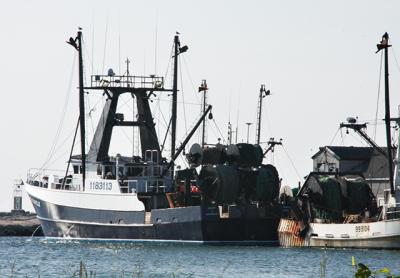 Fishermen believe a monument in the Mid-Atlantic is unnecessary and allege it was not based on science but pressure from nongovernmental environmental groups, including the Pew Charitable Trusts and the National Resources Defense Council. To exclude commercial fishermen while allowing recreational fishing makes no sense, fishermen contend. They also claim the monument will not only fail to prevent harm to non-target species such as pilot whales, but will increase interactions with them. “It’s a huge blow,” Hank Lackner of the Jason and Danielle, a trawler based in Montauk, said. “And there was no need for it.” Mark Phillips, who fishes for fluke, squid, and haddock from the Greenport-based Illusion, agreed. “The funny thing, there is no coral there. It’s all sand and mud, and I’ve dragged all of that bottom. A handful of boats out of Montauk have dragged it all. There is no coral, period,” he said. Scientists from the National Oceanic and Atmospheric Administration agree that many of the areas in which trawlers fish are devoid of coral, according to Ms. Brady. Read the article here 12:08
Fishermen believe a monument in the Mid-Atlantic is unnecessary and allege it was not based on science but pressure from nongovernmental environmental groups, including the Pew Charitable Trusts and the National Resources Defense Council. To exclude commercial fishermen while allowing recreational fishing makes no sense, fishermen contend. They also claim the monument will not only fail to prevent harm to non-target species such as pilot whales, but will increase interactions with them. “It’s a huge blow,” Hank Lackner of the Jason and Danielle, a trawler based in Montauk, said. “And there was no need for it.” Mark Phillips, who fishes for fluke, squid, and haddock from the Greenport-based Illusion, agreed. “The funny thing, there is no coral there. It’s all sand and mud, and I’ve dragged all of that bottom. A handful of boats out of Montauk have dragged it all. There is no coral, period,” he said. Scientists from the National Oceanic and Atmospheric Administration agree that many of the areas in which trawlers fish are devoid of coral, according to Ms. Brady. Read the article here 12:08
Fish farms a necessity: minister – It’s time to get this crap out of the water and into industrial parks
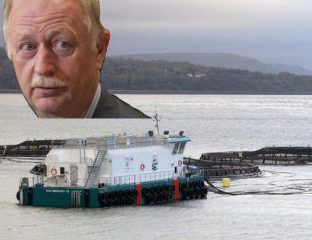 Farmed fish are here to stay as wild fish stocks have come under increasing pressure worldwide, says Nova Scotia Fisheries and Aquaculture Minister Keith Colwell. Colwell responded Thursday to a federal audit tabled before parliament that warned the Department of Fisheries and Oceans had not yet crafted a plan to restore 12 of 15 wild fish stocks deemed to be in critical condition. “The real issue is we don’t have enough wild fish stocks. We’re probably fishing worldwide to the maximum it can be,” Colwell told the Chronicle Herald Thursday. Read the story here
Farmed fish are here to stay as wild fish stocks have come under increasing pressure worldwide, says Nova Scotia Fisheries and Aquaculture Minister Keith Colwell. Colwell responded Thursday to a federal audit tabled before parliament that warned the Department of Fisheries and Oceans had not yet crafted a plan to restore 12 of 15 wild fish stocks deemed to be in critical condition. “The real issue is we don’t have enough wild fish stocks. We’re probably fishing worldwide to the maximum it can be,” Colwell told the Chronicle Herald Thursday. Read the story here
The Minister is using fear monger tactics to push open pen aquaculture as the savior of humanity, but, at what cost? If this is as he say’s, and he cares about environmental issues, there is only one answer, and it is to remove this industry from the ocean and into enclosed facility’s on land in industrial parks that keep wild fish segregated from the chemicals and waste generated by this industry. Large concrete tanks with the ability to treat the waste is the only answer. Cooke Aquaculture seems to have plenty of money to buy into fishery’s in the US, and other country’s while they wreak havoc on area’s that they conduct their business, perhaps they should invest in enclosed land based fish farms. Perhaps the Minister should do the right thing instead of boosting profits and environmental destruction for the open pen aquaculture industry. 10:48
Is ‘fishermen’ a sexist and exclusionary term?
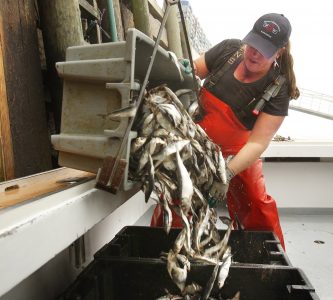 Many words in English can come across as exclusionary. But is “fishermen” one of them? And if not, what’s the alternative? A question came to my desk the other day: “Hello, can I ask a language question? Is it ‘fishermen’ or ‘fishers’? “Fishermen is obviously discriminatory, but fishers seems to be disliked by many within ABC Rural. And fisherpeople is out of the question. As someone who has never fished I feel like I have no authority to decide.” It’s a good question, asked with noble intentions. But one thing made me pause: is “fishermen” an exclusionary term? There’s a line on this that says it isn’t. Read the story here 09:34
Many words in English can come across as exclusionary. But is “fishermen” one of them? And if not, what’s the alternative? A question came to my desk the other day: “Hello, can I ask a language question? Is it ‘fishermen’ or ‘fishers’? “Fishermen is obviously discriminatory, but fishers seems to be disliked by many within ABC Rural. And fisherpeople is out of the question. As someone who has never fished I feel like I have no authority to decide.” It’s a good question, asked with noble intentions. But one thing made me pause: is “fishermen” an exclusionary term? There’s a line on this that says it isn’t. Read the story here 09:34
Seven plead guilty to illegal Elver Eel trafficking
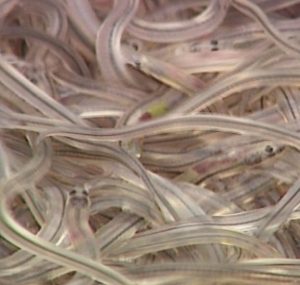 Seven people pleaded guilty to federal charges of trafficking nearly $2 million worth of baby eels on the East Coast. The pleas took place between Tuesday and Thursday at federal court in Portland. Six pleaded guilty to selling or transporting illegally harvested elvers in interstate commerce. Elvers can only be fished commercially in Maine and South Carolina and are one of the country’s most lucrative fisheries on a by-the-pound basis. They are sold to Asia and used for sushi. The six who pleaded guilty to selling or transporting the elvers were Yarann Im, Mark Green, John Pinkham, Thomas Reno, Michael Bryant and George Anestis. Thomas Choi pleaded guilty to exporting elvers that he knew had been harvested illegally. The charges carry a maximum of five years in jail. link 08:30
Seven people pleaded guilty to federal charges of trafficking nearly $2 million worth of baby eels on the East Coast. The pleas took place between Tuesday and Thursday at federal court in Portland. Six pleaded guilty to selling or transporting illegally harvested elvers in interstate commerce. Elvers can only be fished commercially in Maine and South Carolina and are one of the country’s most lucrative fisheries on a by-the-pound basis. They are sold to Asia and used for sushi. The six who pleaded guilty to selling or transporting the elvers were Yarann Im, Mark Green, John Pinkham, Thomas Reno, Michael Bryant and George Anestis. Thomas Choi pleaded guilty to exporting elvers that he knew had been harvested illegally. The charges carry a maximum of five years in jail. link 08:30
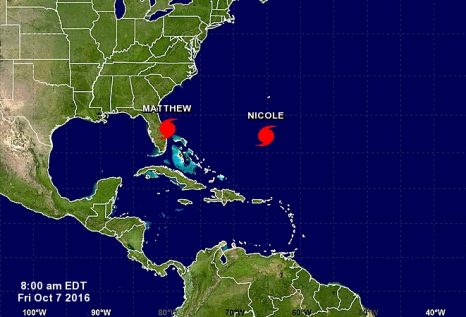
Oct 7 0500 – HURRICANE MATTHEW MOVING PARALLEL TO AND JUST OFFSHORE OF THE EAST COAST OF FLORIDA
At 500 AM EDT (0900 UTC), the eye of Hurricane Matthew was located by NOAA Doppler weather radars and an Air Force Reserve Hurricane Hunter aircraft near latitude 28.2 North, longitude 80.0 West. Matthew is moving toward the north-northwest near 13 mph (20 km/h), and this general motion is expected to continue today. A turn toward the north is expected tonight or Saturday. On the forecast track, the center of Matthew will be moving near or over the east coast of the Florida peninsula through tonight, and near or over the coasts of Georgia and South Carolina on Saturday. Maximum sustained winds are near 120 mph (195 km/h) with higher gusts. Matthew is a category 3 hurricane on the Saffir-Simpson Hurricane Wind Scale. Although weakening is forecast during the next 48 hours, Matthew is expected to be a category 3 hurricane as it moves near the coast of Florida today. Read the update here 07:30
Stay, or Go. McClellanville Fishermen face tough decision as Hurricane Matthew approaches
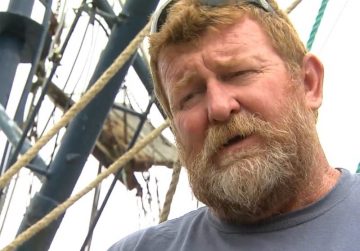 Hurricane Hugo just devastated the sleepy fishing village of McClellanville, but they rebuilt and started fishing again. The community has since weathered several storms. As Hurricane Matthew approaches, fishermen have some of the toughest decisions to make. “I have a house but i stay on my boat,” said shrimp boat captain Timmy Glines. “I don’t have insurance, a lot of money invested and i don’t want to lose it.” Glines will stay but he knows the destruction Hugo caused firsthand “It was very scary,” Glines said. “I don’t want to do it again, ever ever. This is just a bit less, if it was 150 mph, I’d get out of here.” The big question for the captains here– should I stay or should I go. The docks in McClellanville look like the back of an entertainment center — boats and ropes tied up so tightly — some captains staying, others will go. Video, Read the story here 06:57
Hurricane Hugo just devastated the sleepy fishing village of McClellanville, but they rebuilt and started fishing again. The community has since weathered several storms. As Hurricane Matthew approaches, fishermen have some of the toughest decisions to make. “I have a house but i stay on my boat,” said shrimp boat captain Timmy Glines. “I don’t have insurance, a lot of money invested and i don’t want to lose it.” Glines will stay but he knows the destruction Hugo caused firsthand “It was very scary,” Glines said. “I don’t want to do it again, ever ever. This is just a bit less, if it was 150 mph, I’d get out of here.” The big question for the captains here– should I stay or should I go. The docks in McClellanville look like the back of an entertainment center — boats and ropes tied up so tightly — some captains staying, others will go. Video, Read the story here 06:57
Toxic algae bloom closes Downeast Maine shellfish industry
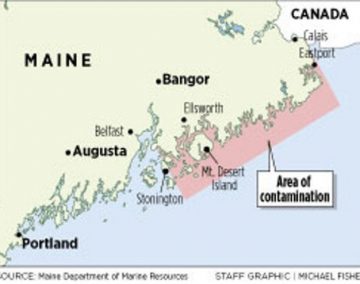 Last week, the Department of Marine Resources issued a recall of mussels, clams and quahogs caught in Downeast Maine after samples tested positive for domoic acid, a biotoxin that causes illness, memory loss, brain damage and possibly death in humans. At the same time, the state banned harvesting for mussels, clams, oysters and carnivorous snails on parts of a wide swath of coastline from Deer Isle to the Canadian border. “A closure for this toxin in Eastern Maine is unprecedented, that is not anything anyone has ever seen,” said Darcie Couture, a Brunswick marine scientist and former head of the state’s marine biotoxin program. “No one on this coast is that experienced with a domoic acid event,” Couture said. “I don’t think it is sinking in how serious this is.” Read the story here 23:07
Last week, the Department of Marine Resources issued a recall of mussels, clams and quahogs caught in Downeast Maine after samples tested positive for domoic acid, a biotoxin that causes illness, memory loss, brain damage and possibly death in humans. At the same time, the state banned harvesting for mussels, clams, oysters and carnivorous snails on parts of a wide swath of coastline from Deer Isle to the Canadian border. “A closure for this toxin in Eastern Maine is unprecedented, that is not anything anyone has ever seen,” said Darcie Couture, a Brunswick marine scientist and former head of the state’s marine biotoxin program. “No one on this coast is that experienced with a domoic acid event,” Couture said. “I don’t think it is sinking in how serious this is.” Read the story here 23:07
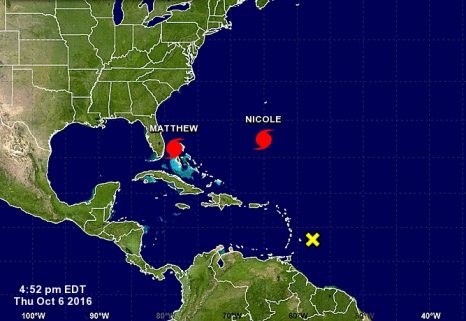
Oct 6, 2016 17:00 EDT – Hurricane Matthew Approaching the Southeast U.S. Coast
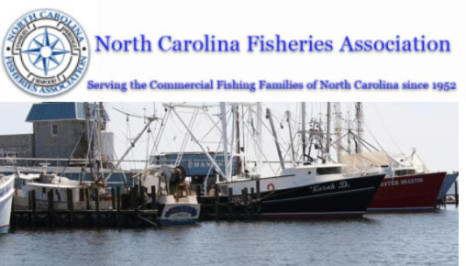
BREAKING NEWS From North Carolina Fisheries Association – JUDGE RULES IN OUR FAVOR!!!
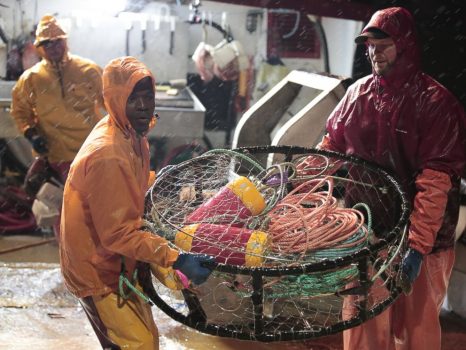
Inside One of the World’s Most Dangerous Jobs
Up to 10 inches wide -– some weighing almost 3 pounds — with 10 legs and of course, claws that can break a finger — Dungeness crab fishing is not for the faint of heart. Add to that the unforgiving weather and potentially tumultuous relationships on board the boats, the situation can become dangerous and deadly at times. No one knows that better than Captain Gary ‘the Ripper’ Ripka and his son Kenny, who own and operate two commercial fishing boats in Newport, Oregon, the Dungeness Crab Capital of the World. “It’s a pretty high-risk job, the most dangerous job in the world,” Gary Ripka told ABC News’ Chief Business, Economics and Technology Correspondent Rebecca Jarvis on a recent episode of Real Biz with Rebecca Jarvis. Video, read the rest here 16:07
Head of UCIDA hopes for fisheries plan based on 10 MSA national standards
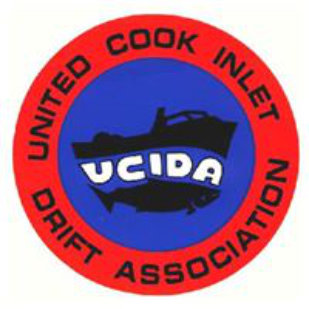 After the well-publicized court win by commercial fishing groups requiring the North Pacific Fishery Management Council to work with the state to establish a Fisheries Management Plan for salmon fisheries that take place largely in federal waters complying with the Magnuson-Stevens Act, the question is, now what? That will be a topic of discussion at the council meeting taking place this week. In the meantime, David Martin, president of United Cook Inlet Drift Association, one of the groups that filed and funded the suit, commented on what some of the issues are, and the thinking behind the suit. While the suit is still open to the appeals process, after having won a unanimous decision from the Ninth Circuit, the state has expressed reluctance to appeal. Read the story here 15:11
After the well-publicized court win by commercial fishing groups requiring the North Pacific Fishery Management Council to work with the state to establish a Fisheries Management Plan for salmon fisheries that take place largely in federal waters complying with the Magnuson-Stevens Act, the question is, now what? That will be a topic of discussion at the council meeting taking place this week. In the meantime, David Martin, president of United Cook Inlet Drift Association, one of the groups that filed and funded the suit, commented on what some of the issues are, and the thinking behind the suit. While the suit is still open to the appeals process, after having won a unanimous decision from the Ninth Circuit, the state has expressed reluctance to appeal. Read the story here 15:11
Canada’s Bluefin Tuna Management: Time to Get it Right
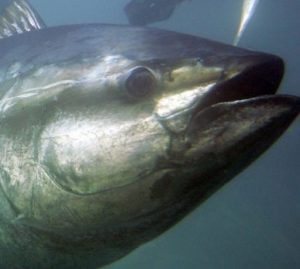 Back in August, Fisheries and Oceans Canada (DFO) released its recommendations on whether or not to list several marine species as endangered or threatened under the Species At Risk Act (SARA)—one of which was Atlantic bluefin tuna. Listing under SARA means the species is protected under Canadian law, and it becomes illegal to kill, harm, harass, capture or take an individual and prohibits the possession or trade of products made from them. DFO’s recommendation on bluefin was to not list bluefin under the Act, mostly citing the socio-economic impacts that would result from closing the Atlantic Canadian bluefin fishery if listed. Regardless of whether the government lists the species on SARA or not, these bluefin need more attention as they are currently at just 55% of their already depleted 1970s levels. Read the story here 14:02
Back in August, Fisheries and Oceans Canada (DFO) released its recommendations on whether or not to list several marine species as endangered or threatened under the Species At Risk Act (SARA)—one of which was Atlantic bluefin tuna. Listing under SARA means the species is protected under Canadian law, and it becomes illegal to kill, harm, harass, capture or take an individual and prohibits the possession or trade of products made from them. DFO’s recommendation on bluefin was to not list bluefin under the Act, mostly citing the socio-economic impacts that would result from closing the Atlantic Canadian bluefin fishery if listed. Regardless of whether the government lists the species on SARA or not, these bluefin need more attention as they are currently at just 55% of their already depleted 1970s levels. Read the story here 14:02
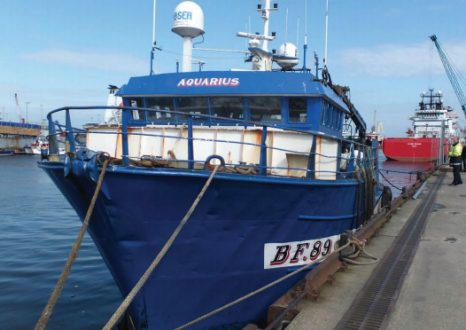
Safety failings on fishing trawler Aquarius led to fisherman’s death
An investigation has revealed that the twin rig trawler, Aquarius was “a poorly run vessel”, issued with 137 deficiencies in the years prior to the death of Nuertey Annang. The Ghanaian-born fisherman, who was 47, died on 17 August 2015 when a rope stopper parted and he was thrown “violently” overboard. The vessel was around two miles east of Aberdeen harbour in Scotland when the incident happened. Despite searches, Annang’s body was never found. A report by the Marine Accident Investigation Branch (MAIB) identifies that “The skipper and owners of Aquarius consistently prioritised the catching of fish over the safety of the vessel and its crew. This resulted in the promotion of a poor safety culture.” It found that the crew, nor their vessel “had been adequately prepared to deal with such emergency situations.” Read the story here 13:40
Obama’s new ocean preserves are bad for the environment and for people
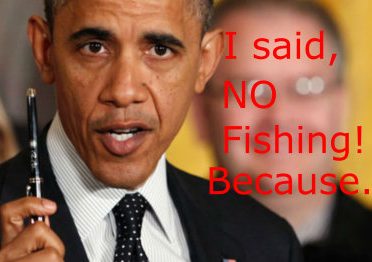 Who wants to save the oceans? Short answer: everyone, especially politicians. A less frequently asked question is whether their high-profile efforts always work. Right now, world leaders seem to want to see who can declare the biggest marine protected areas, or MPAs, in their territory. MPAs are kinds of national parks for sea life that extends from ocean surface to ocean floor. Commercial fishing and other undersea ventures are banned in them. They are popping up everywhere. In August, President Obama announced one in the western Pacific Ocean that is 50 per cent bigger than Texas. In September he created another, more modest one off the coast of New England. Britain announced yet another MPA in September around St. Helena Island in the south Pacific. It is half the size of the Lone Star State. In fact, the MPA movement has become a religion with accepted articles of faith that more and bigger are better. This current obsession is bad for the oceans, bad for the global environment, and bad for people. Consider what the imposition of an MPA can do to the economy and livelihood of local fishers, who are unable to easily pick up and move elsewhere. Some fishermen in New England are warning that they could go out of business as a result of the new Atlantic marine preserve. Read the op-ed here 10:48
Who wants to save the oceans? Short answer: everyone, especially politicians. A less frequently asked question is whether their high-profile efforts always work. Right now, world leaders seem to want to see who can declare the biggest marine protected areas, or MPAs, in their territory. MPAs are kinds of national parks for sea life that extends from ocean surface to ocean floor. Commercial fishing and other undersea ventures are banned in them. They are popping up everywhere. In August, President Obama announced one in the western Pacific Ocean that is 50 per cent bigger than Texas. In September he created another, more modest one off the coast of New England. Britain announced yet another MPA in September around St. Helena Island in the south Pacific. It is half the size of the Lone Star State. In fact, the MPA movement has become a religion with accepted articles of faith that more and bigger are better. This current obsession is bad for the oceans, bad for the global environment, and bad for people. Consider what the imposition of an MPA can do to the economy and livelihood of local fishers, who are unable to easily pick up and move elsewhere. Some fishermen in New England are warning that they could go out of business as a result of the new Atlantic marine preserve. Read the op-ed here 10:48






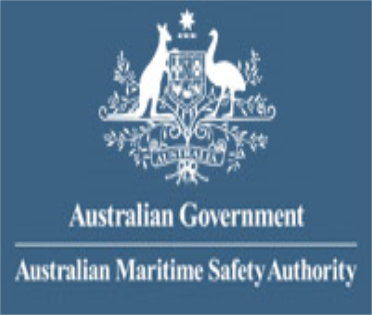 The Australian Maritime Safety Authority is undertaking a major campaign across Far North Queensland targeting fishing fleets under the influence of drugs. Five men have already been charged after Cairns Water Police conducted a joint agency patrol in remote northern waters. Water police travelled 800km over an extensive eight day operation from Cairns to Cape Grenville. The search began on the 20th September this year, targeting vessels that were operating under the influence of drugs. Sergeant Andrew Ibell said the amount of fishermen with drugs in their system was alarming and correlated with marine incidents over the last few years. In total 37 boats were intercepted and five skippers tested positive to having drugs in their system. It is alleged a combination of methamphetamine and cannabis was detected within the operators,’ Mr Ibell said.
The Australian Maritime Safety Authority is undertaking a major campaign across Far North Queensland targeting fishing fleets under the influence of drugs. Five men have already been charged after Cairns Water Police conducted a joint agency patrol in remote northern waters. Water police travelled 800km over an extensive eight day operation from Cairns to Cape Grenville. The search began on the 20th September this year, targeting vessels that were operating under the influence of drugs. Sergeant Andrew Ibell said the amount of fishermen with drugs in their system was alarming and correlated with marine incidents over the last few years. In total 37 boats were intercepted and five skippers tested positive to having drugs in their system. It is alleged a combination of methamphetamine and cannabis was detected within the operators,’ Mr Ibell said. 



























